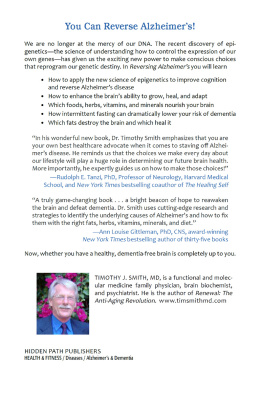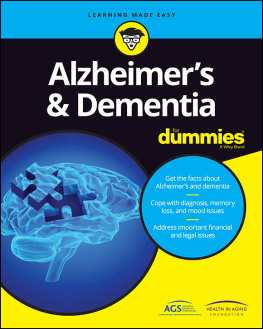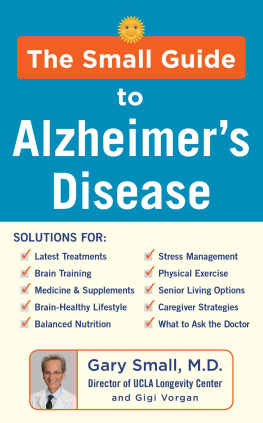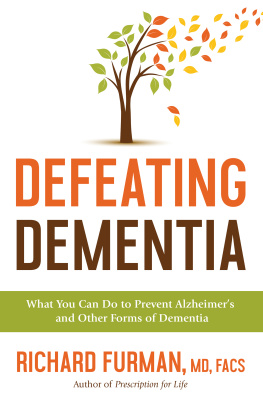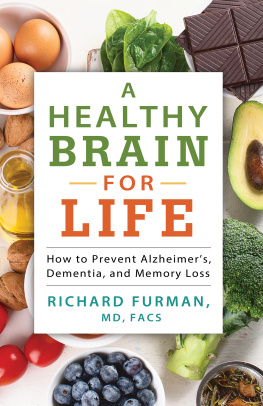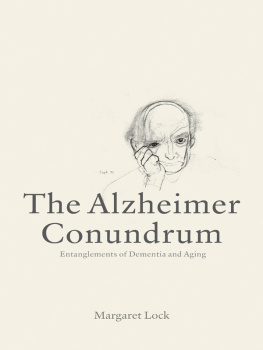Is It Alzheimers?
A Johns Hopkins Press Health Book
Is It Alzheimers?

101 ANSWERS TO YOUR MOST PRESSING QUESTIONS ABOUT MEMORY LOSS AND DEMENTIA

Peter V. Rabins, MD, MPH

Note to the Reader: This book is not meant to substitute for medical care and treatment should not be based solely on its contents. Instead, treatment must be developed in a dialogue between the individual and his or her physician. Our book has been written to help with that dialogue.
Drug dosage: The author and publisher have made reasonable efforts to determine that the selection of drugs discussed in this text conform to the practices of the general medical community. The medications described do not necessarily have specific approval by the US Food and Drug Administration for use in the diseases for which they are recommended. In view of ongoing research, changes in governmental regulation, and the constant flow of information relating to drug therapy and drug reactions, the reader is urged to check the package insert of each drug for any change in indications and dosage and for warnings and precautions. This is particularly important when the recommended agent is a new and/or infrequently used drug.
2020 Johns Hopkins University Press
All rights reserved. Published 2020
Printed in the United States of America on acid-free paper
9 8 7 6 5 4 3 2 1
Johns Hopkins University Press
2715 North Charles Street
Baltimore, Maryland 21218-4363
www.press.jhu.edu
Library of Congress Cataloging-in-Publication Data
Names: Rabins, Peter V., author.
Title: Is it Alzheimers? 101 Answers to Your Most Pressing Questions about Memory Loss and Dementia / Peter V. Rabins, MD, MPH.
Description: Baltimore : Johns Hopkins University Press, 2020. | Series: A Johns Hopkins Press Health Book | Includes index.
Identifiers: LCCN 2019015979 | ISBN 9781421436395 (hardcover : alk. paper) | ISBN 1421436396 (hardcover : alk. paper) | ISBN 9781421436401 (pbk. : alk. paper) | ISBN 142143640X (pbk. : alk. paper) | ISBN 9781421436418 (electronic) | ISBN 1421436418 (electronic)
Subjects: LCSH: Alzheimers diseaseMiscellanea. | DementiaMiscellanea.
Classification: LCC RC523.2 .R33 2020 | DDC 616.8/311dc23
LC record available at https://lccn.loc.gov/2019015979
A catalog record for this book is available from the British Library.
Special discounts are available for bulk purchases of this book. For more information, please contact Special Sales at 410-516-6936 or .
Johns Hopkins University Press uses environmentally friendly book materials, including recycled text paper that is composed of at least 30 percent post-consumer waste, whenever possible.
Note to the Reader
Is It Alzheimers? is not intended for use as medical or legal advice and should not be used in that way. Individuals should always ask their medical practitioner and lawyer about questions they have about their own care or, when authorized, about the care of other people.
This book contains discussions of the off-label use of medications. This means that some medications are discussed that have not been approved for that use by the Food and Drug Administration. These discussions are not intended to be an endorsement of the use of these medications. Rather, these discussions describe how medications are prescribed by some practitioners and describe whether there is scientific evidence supporting their use.
Peter Rabins has received no financial support from pharmaceutical companies in the past 5 years.
Preface
This book answers 101 of the most common questions I am asked about Alzheimer disease and other dementias. It was written to supplement The 36-Hour Day, which Nancy Mace and I first published almost 40 years ago.
Readers who find this book helpful but want more information should turn to The 36-Hour Day. It has more detail on the 4 central themes of this book: information on the diseases that cause dementia; tips on how to improve the quality of life of people with dementia and manage the symptoms caused by the disease; suggestions for caregivers about steps they can take to improve their psychological and physical well-being; and a summary of some recent research advances.
The 36-Hour Day and Is It Alzheimers? both use the labels Alzheimer disease, Parkinson disease, and Huntington disease without an apostrophe after the name of the person credited with first describing the disease. I (and some others) omit the apostrophe because it implies that the disease belongs to the doctor who first described it. I have also chosen to use the term caregiver, even though alternative words and phrases have been suggested. Each of the alternatives also has limitations and caregiver is still the most widely used term in the United States.
Some of the questions I answer address issues about which experts disagree. I have tried to indicate when this is the case so that the reader will know that I am expressing an opinion that knowledgeable experts may disagree with. Such disagreements are inherent to the discussion of any issue about which there is ongoing research and a consensus has not emerged. Two examples of such issues are the prevention of dementia and the cause of Alzheimer disease.
For 40 years I have had the extraordinary gift of knowledgeable and supportive teachers and colleagues. Many of the answers in this book are informed by what they have taught me. Likewise, many answers in the book can be traced to information I have learned from patients and caregivers. I am indebted to all those who have contributed in this way, but I take full responsibility for any errors. I have also been the beneficiary of financial support from the T. Rowe and Eleanor Price Foundation, the Richman Family Professorship for Alzheimer Disease and Related Disorders at Johns Hopkins University, the Stempler Fund for Dementia Research, the National Institute of Mental Health, the National Institute on Aging, the National Institute of Neurological Disorders and Stroke, and many individual donors. This support has been crucial to my efforts in public education, including this book.
Is It Alzheimers?
1
Should I Worry about My Memory?

Q1. What happens to memory and thinking as we age?

A1. Beginning in our 30s or 40s, the retrieval of information that we know, especially names and words, becomes more difficult. This ability is sometimes referred to as free recall memory, because it is our attempt to report, in words and without clues, knowledge we have stored in our brain. Research has shown that the average 25-year-old can recall between 6 and 7 words from a list of 10 unrelated words read to them several minutes before. The average 75-year-old, in contrast, recalls about 5 words from that list. This means that free recall memory declines as we age, even though the change is not dramatic.
The results are different if you change the experiment. The study starts out the same, giving people a list of 10 words to remember. But rather than ask them to recall as many words as they can after the several-minute delay, the researcher gives them a written list of 20 words, 10 of which are the words they were asked to remember and 10 of which are new words. When asked to circle only the 10 words they were initially asked to remember, the 75-year-olds and the 25-year-olds do equally well. This indicates that the ability to correctly recognize previously encountered information,
Next page

